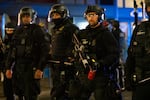U.S. District Judge Marco Hernandez said Wednesday he’s contemplating requiring Portland police officers who carry less-lethal impact munitions to wear body cameras.
The judge’s suggestions came out of a court hearing where the attorneys representing the city of Portland and nonprofit Don’t Shoot Portland detailed various ideas for what sanctions Hernandez should impose after finding the city in contempt of his June court order that restricted officers’ use of crowd control weapons at protests.
Following a multi-day hearing this fall with testimony from officers and protesters, Hernandez determined in November that the city had violated his order three times on the evening of June 30 at a protest outside the police union’s headquarters. Two of the incidents involved officer Brent Taylor, a member of the bureau’s Rapid Response Team who fired off a total of 15 rounds from his riot gun.
Attorneys representing both the city and Don’t Shoot Portland, a local civil rights group who brought the lawsuit, arrived at the hearing with their own suggestions as to what remedies the judge should impose. The judge floated several of his own proposals, including body cameras which he said he envisioned as “Go Pros on their helmets.”

PPB Officer Brent Taylor, right, holds an FN303 less lethal launcher and a can of pepper spray while dispersing a crowd of protesters on August 12, 2020 in downtown Portland.
Jonathan Levinson / OPB
Hernandez said he recognized that ordering body cameras might cause the city to run into collective bargaining issues, but added he didn’t believe he was constrained by the city’s agreement with the police union.
“I don’t know if I put the city in an awkward position where they’re having to respond to something in a way that may be inconsistent with what they’ve agreed to as part of the collective bargaining agreement,” he said. “But that’s OK. You can tell me that and then I’ll decide whether or not to ignore you.”
The police bureau has said in the past it would be supportive of body cameras, but the city chose not to fund the fledgling body camera program this fiscal year. Commissioner Jo Ann Hardesty, a vocal critic of the police, has said in the past she does not want police outfitted with cameras, calling it an “expensive, false solution” that will not improve police conduct.
Hernandez also emphasized he wanted the city to train officers using less-lethal and non-lethal weapons to be able to articulate to the court why they were using their weapons before firing.
“They need to be able to articulate what the specific danger was and why it was imminent,” he said. “If they can not do that, they should not pull the trigger.”
Attorneys for Don’t Shoot Portland asked the judge Wednesday to order a full ban on the use of automatic and semi-automatic impact weapons at protests, arguing that rapid fire use of these weapons contradicted the bureau’s obligation to ensure that each use of force by an officer is justified.
According to court filings, each of the three violations Hernandez cited in his contempt finding were from an officer using a FN303, a riot gun that fires small plastic bullets.
Juan Chavez, an attorney representing Don’t Shoot Portland, argued at the hearing that officers were relying on the weapons rather than focusing on de-escalation and negotiation. These rapid-firing weapons had no place at protests, he said.
“This weapon itself - the semi automatic FN303 - in fact, enables this kind of violative behavior and it’s their ability to use potentially lethal force rapidly and repeatedly ... that actually creates this problem here,” Chavez said.
Naomi Sheffield, deputy city attorney, argued the plaintiffs were asking for remedies far beyond the scope of the judge’s finding of contempt and that improved training would be a better corrective step.
“We think training is a more appropriate remedy than a complete ban on the FN303 because we do believe that it can be a tool that is used correctly and appropriately,” she said.
Attorneys for the city had proposed their own potential remedies, a significantly more limited list than what the plaintiffs had suggested.
According to a proposal filed Tuesday evening, the city had already given all grenadiers, who are armed with less-lethal impact munitions, and supervisors nine hours of training on use of force at protests. By the end of the year, the city said it would make all sworn PPB members complete a three hour training on the same topic and would recirculate copies of the court’s order, requiring members to certify they understand.
They also said the city would look into alleged misconduct by Officer Taylor, who would be removed from protest-duties while the investigation is underway.
Don’t Shoot Portland wants the city to go further. As part of the list of possible remedies, the attorneys are asking for Taylor to be permanently banned from protest duties -- in addition to any officer who violates the court’s order in the future.
“I don’t believe that anything else would be adequate in showing the other officers that there will be consequences if they violate this order,” said Chavez. “It won’t create solely a monetary burden for the city or a new training regime. It would also have a direct impact on whether or not they are allowed to police in these circumstances.”
The plaintiffs also asked Hernandez to order an “expedited review process” for potential violations of court order, where the city would be mandated to hand over related documents within 48 hours of the plaintiffs flagging an incident.
The judge questioned whether this was a realistic timeline. Sheffield argued it was not and would leave the city scrambling to produce records for incidents that may have occurred long ago or risk a fine.
The judge has requested both parties provide a written response to the remedies he suggested by Jan. 29. A hearing to discuss the matter further is scheduled for Feb. 9 at 3 p.m.



